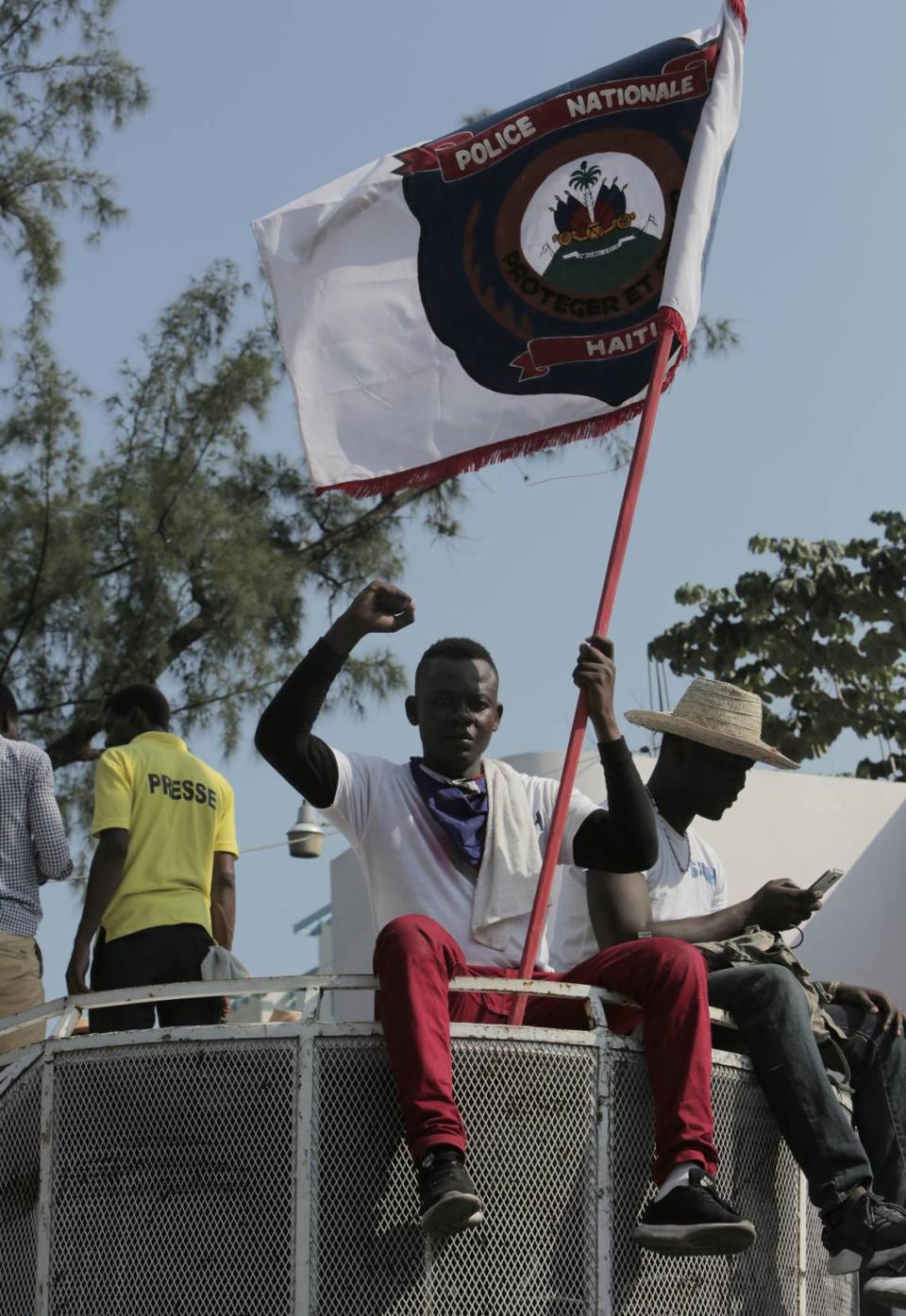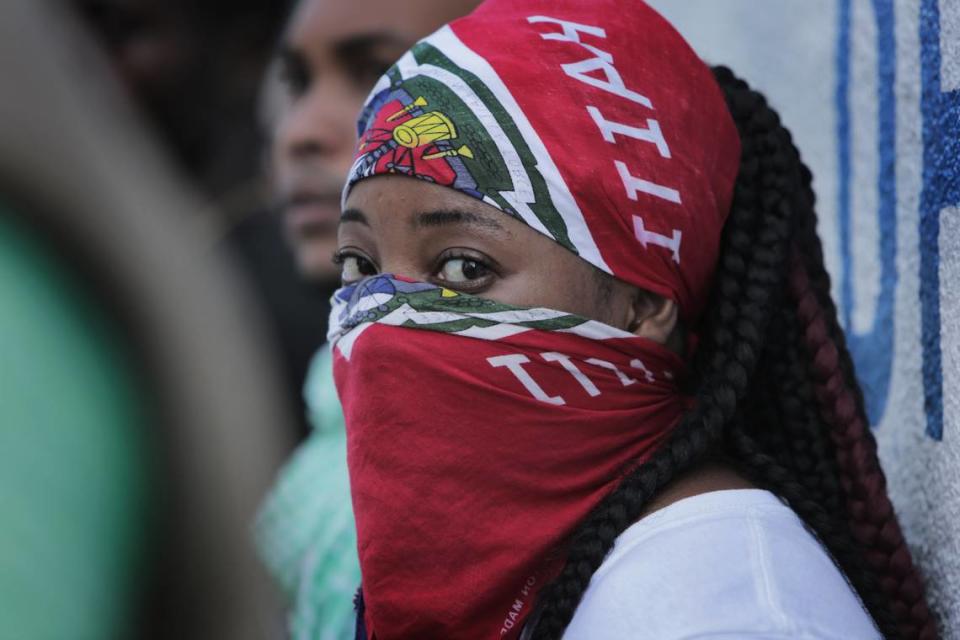While Haiti police take frustrations out on streets, U.N. sounds alarm on gangs, bad cops
Angry over poor pay and miserable working conditions, members of Haiti’s U.S.-backed and United Nations-trained police force are taking their frustrations out on the streets.
They are illegally firing their weapons in the air, vandalizing government property and reportedly setting fire to viewing stands ahead of this weekend’s three-day Pre-Lenten Carnival celebration.
The anger climaxed Monday with Haiti National Police officers, many of them dressed in red T-shirts with their faces covered, marching through the streets of Port-au-Prince, demanding the right to unionize while decrying the lack of pay, poor treatment and health insurance. At the same time, they reminded everyone of what they do.
“In front of nightclubs = Police; VIP motorcade = Police; Earthquake = Police,” read some of the signs written on red posters.
— TOUJOULA (@toujoula) February 18, 2020
Soon video footage emerged showing the protesting cops creating chaos on the streets of Petionville as they discharged their weapons in the air outside of police headquarters in broad daylight before making their way to downtown Port-au-Prince. Once on the Champ de Mars, the public square where the presidential palace is located, they again began to fire as Carnival stands went up in smoke.
Videos showed young men in red shirts gathering around the fire and local media pointed the finger at the protesting officers. The National Carnival committee, which is depending on police to provide security for the festivities that start on Sunday, started rebuilding the stands on Tuesday, announcing the show will go on.
Strongly condemning Monday’s violence, acting Haiti Prime Minister Jean-Michel Lapin called on police to respect the public order and protect the institution, which “must be free from political upheavals to remain at the service of democracy,” he said.
“These barbaric, illegal, unacceptable and unworthy acts by the police, remind us of the indiscriminate violence of extremists and terrorists who are hiding behind the demands to sow disorder and chaos,” he said in a press statement issued Tuesday afternoon.
Lapin said the government has taken note of officers’ demands for better treatment, and asked them to show “serenity, patience, and foresight” while Haiti crosses a difficult path. Later in a press conference he said having a hospital for the police is a priority for the government. He also said they must have an efficient ambulance system and an efficient fire department.
The government’s condemnation came on the same day that the United Nations issued a report on gang violence in Port-au-Prince. Focused on a three-day outbreak of gang violence in the pro-opposition Bel Air neighborhood on Nov. 4-6, 2019, U.N. investigators accuse Haitian police of failing to protect residents from corrupt officers and gang leaders. At least three people died in the violence while six others were injured and 30 families were left homeless after their houses were set on fire, the U.N. said. Investigators also noted that the attacks also allegedly involved three active members of the Haiti National Police.
According to the report, one of Haiti’s most notorious gang leaders, former police officer Jimmy Cherizier, who goes by the name Barbecue, was behind the attacks. Cherizier is the subject of a February 2019 warrant, which has not been carried out, for his alleged involvement in another massacre, this one in the Grand Ravine neighborhood in November 2017. He has also been cited in the La Saline massacre, in November 2018.
Bel Air, U.N. human rights investigators noted, is under the informal control of gang leaders who engage in criminal activity such as murder, extortion and kidnappings for ransom, theft and the hijacking of trucks. The neighborhood is also considered one of the traditional bases for anti-government mobilization. The report said Cherizier in a radio interview denied his involvement in the Bel Air attack but offered to compensate the victims who lost their houses.
“Far from being an isolated incident, the Bel Air attack illustrates the recent evolution of the current context in Haiti, mainly characterized by widespread insecurity in working-class neighborhoods and slums, the impunity of criminal gang members who commit human rights abuses, the alleged collusion between them and certain political and economic actors, the links between gang members and some Haitian National Police officers, as well as the lack of police intervention to protect the population,” the report said.
Among the recommendations, investigators with the U.N. Human Right’s Office and the United Nations Integrated Office in Haiti called on Haitian authorities to do more to protect residents in Bel Air and other similar neighborhoods, and to conduct independent and in-depth judicial investigations into acts of violence committed by gangs in Bel Air. The perpetrators of violence should also be brought to justice, they said.
While the U.N. report was released amid increased concerns about violence in Haiti, Monday’s violent revolt by officers was only the latest after a series of unprecedented protests, buoyed by simmering discontent, began sweeping through the Haiti National Police last year.
Founded in 1995 after Haiti was forced to disband the army, the police, who have been plagued by allegations of human rights violations and corruptions, have been the focus of ongoing rebuilding efforts ever since a U.N. peacekeeping mission returned in 2004 and found that the force had been decimated by political interference, corruption and drug trafficking.

In recent years, the United States, Canada and the U.N., have invested millions in training and recruiting officers to get the force to where it is today, about 15,000 strong. But with Haiti in a constant state of political and economic turmoil, officers have found themselves overworked, poorly equipped and poorly paid in trying to address the country’s security needs, which lately have included anti-government protests and a deadly resurgence in kidnappings.
Police officers earned on average between 20,000 gourdes and 25,000 gourdes a month, or $221 and $276 before taxes. With the country’s double-digit inflation, depreciating domestic currency and rising cost of living, the money amounts to very little, they say.
“We are sent into operations without tear gas, without bullets, without boots, without uniforms,” said Yanick Joseph, one of the leaders of the union movement.
On Nov. 17, frustrations came to a boil with Joseph and other officers announcing the formation of a union in front of police headquarters in Petionville. The move put officers in an open conflict with the high command of the police, whose internal regulations prohibit such organizing efforts.

Some didn’t seem to care, however.
During the show of force, officers, some with their faces hidden and others choosing not to be covered, listed their grievances. As they spoke, uniformed and sympathizing colleagues quietly looked on. from a distance.
“We don’t have a salary. We have a miserable salary,” said an officer who didn’t want to give his name. “When we go on a mission, they keep the money ...we are saying ‘No more.’ The money for reassignment has to be given, police officers should get it.”
The unionization effort, the officer said, has defined itself and after 24 years of existence, the police could take control of its own destiny, he argued. “We are in a battle. We aren’t attacking anyone and we don’t want anyone to attack,” he said.
Jeff Hassler, who lost his right leg during a police operation in the Savane Pistache neighborhood, said he received “no assistance,” following his injury.
“We will always pound the pavement demanding a union and assistance for disabled police officers,” he said, standing with the help of crutches while holding up a sign that read “Police officers suffering from a disability deserve help.”
Until recently Haitian officials and police hierarchy did not say much about the union effort despite several street protests, which drew hundreds of officers both in the capital and in Cap Haitien, the second largest city. Then came Feb. 7 when Joseph, 34, was summoned to the the Office of the Police Inspector General.
In an interview with the Herald, Joseph — who was fired Tuesday for “revolt,” “insurgency” and “unusual conduct” by Inspector General Hervé Julien for the Feb. 7 incident, along with four other police officers — said she had been summoned to be questioned about her union activities.
Once there, Joseph said she was asked to surrender her weapon and badge and told she would be put under investigation where she would have to report to the Inspector General’s office every day from 8 a.m. to 4 p.m. until the end of the investigation.
That’s when the first blowup happened.
Hooded police officers barged into the office, grabbed Joseph and, according to others and a statement issued by Police Chief Normil Rameau, the officers verbally and physically attacked police personnel, destroyed equipment, busted windows and tagged police vehicles with the union’s initials, SPNH.
Once outside of the headquarters, officers discharged their guns in the air.
Joseph did not respond to calls from the Herald on Tuesday about her firing and accusations union supporters were the ones who burned the stands. But in a previous interview, she denied them trashing the Inspector General’s premises and defended officers’ right to form a union, arguing the Haitian constitution gave the right to association.
“We are not pushing for a union to allow police officers to go steal, to join gangs or go into drug trafficking,” she said. “That’s not why we have come together. Imagine, a police officer dies and it’s the mayor [of a city] who has to give a coffin for him to be buried.”
“We find this to be an insult,” she said, about officers and their families being unable to afford funeral expenses. “We are not going to back down because all we are demanding are just.”
Julien said officers are entitled to their opinions, but he will not accept rebellion within his force.
“If we find more officers involved in Feb. 7, we will fire them too,” he said noting that he’s yet to investigate Monday’s incident.
On Wednesday, the day after the firing, civilian-clad Haitian police officers on motorcycles fanned out across the capital, forcing people off of buses and out of their cars in what’s been described as “Operation Block the Road.” The officers were protesting the firing of the five cops, and demanding the right to unionize. Tires were also set ablaze in the streets.
Both the Feb. 7 and Monday incidents have been condemned by human rights activists, who say that while they recognize that Haiti’s police force is plagued with problems and officers have valid demands, the mounting insurgency is worrying.
“It’s a form of rupture in the discipline in the institution of the police and that is something that is dangerous for the corps,” said attorney Samuel Madistin, chairman of the board of the human rights group, Fondation Je Klere (FJKL). “It’s true that the police have problems. But two wrongs do not make a right. It’s not because they have problems, they should attack the hierarchy of the police and commit acts that go against the principle of the institution.”

